2. Market Research - Lecture notes 2 PDF

| Title | 2. Market Research - Lecture notes 2 |
|---|---|
| Course | Marketing |
| Institution | الجامعة التكنولوجية (Iraq) |
| Pages | 4 |
| File Size | 186.1 KB |
| File Type | |
| Total Downloads | 548 |
| Total Views | 587 |
Summary
IMPORTANCE OF MARKET RESEARCH ● Market research = a business activity that discovers information of use in making marketing decisions ○ Essential component of understanding the market ○ Should contribute to improved performance ● Involves five major components: ○ Defining research problem ○ Designin...
Description
IMPORTANCE OF MARKET RESEARCH ● Market research = a business activity that discovers information of use in making marketing decisions ○ Essential component of understanding the market ○ Should contribute to improved performance ● Involves five major components: ○ Defining research problem ○ Designing research methodology ○ Collecting data ○ Analysing data + drawing conclusions ○ Presenting results + making recommendations ● Following factors should be considered when undertaking market research: ○ Relevance ○ Timing ○ Availability of resources ○ Need for new info ○ Cost benefit analysis ○ Implementation should be ethical ● Informs various decisions → market segmentation, sales performance, product, distribution, promotion, pricing, attitudes/behaviours ● Components of marketing info-system:
RESEARCH PROBLEM AND BRIEF ● Research problem = question that market research project is intended to answer ○ Needs to be clearly specified ○ Needs to enable organisation to make marketing decisions ○ Original questions asked may be redefined as research proceeds ● Market research brief = a set of instructions that states: ○ The research problem ○ Information required ○ Specifies the timeframe and budget ○ Will not necessarily propose a methodology or approach for research ● Components of market research brief: ○ Executive summary → overview ○ Introduction → explains why the research needs to be conducted and who is proposing the research ○ Background → details the marketing problem
Problem definition → the question that is to be addressed Time and budget → amount of money needed, when results are needed, milestones + contingencies ○ Reporting schedule → precise dates on which reports are required Research design and issues: ○ ○
●
●
Types of research: ○ Exploratory → gathers more info about a loosely defined problem ○ Descriptive → solves a particular and well-defined problem by clarifying the characteristics of certain phenomena ○ Casual → assumes that particular variable causes a specific outcome - tests variable’s effect on outcome ○ Hypothesis → tentative explanation that can be tested
PRIMARY AND SECONDARY DATA ● Secondary data = data originally gathered or recorded for a purpose OTHER THAN to address the current market research problem ● Primary data = data collected specifically for the current market research project ● Data mining = processing large data sets to identify patterns and trends not obvious or discernible by observation QUANTITATIVE AND QUALITATIVE RESEARCH ● Quantitative research: ○ Collects info that can be represented numerically ○ Approaches include → experimentation, observation, neuroscience ○ Surveys are the most common tool ○ Global shift towards quantitative ● Qualitative research: ○ Intended to obtain detailed info about attitudes and emotions underlying consumer behaviour ○ Techniques include → interviews and focus groups DATA COLLECTION AND ANALYSIS ● Sampling = process of choosing members of the total population ○ Probability sampling → every member of the population has a known chance of being selected in the sample that will be studied ○ Non-probability sampling → provides no way of knowing the chance of a particular member of the population being chosen ○ Sampling error → measure of the extent to which the results from the sample differ from the results that would be obtained from the entire population ● Data collection: ○ Data must be collected according to the methods specified in the research
design Data collection can be conducted in house or outsourced Time and financial resources limited → budgeting and scheduling must be planned to ensure most benefit is derived from research investment Analysis: ○ Data analysis → filtering and organising collected data ○ Quantitative analysis → converts numerical data into knowledge that can be used to inform decision making ○ Qualitative analysis → reduction and coding are used to interpret non-numerical data ○ ○
●
REPORTING OF MARKET RESEARCH FINDINGS TO INFORM MARKETING DECISIONS ● Reporting = presenting research findings to enable decision makers to use the information ○ Conclusions → state what the data has shown in terms of the original research question - suggest courses of action ○ Recommendations → possible courses of future action ● Components of written research report: ○ Cover page and executive summary ○ Table of contents ○ Intro or background ○ Methodology and findings ○ Statement of limitations ○ Conclusion and recommendations ○ Appendices Quiz tips ● End of chapter summaries Value of market research ● Results in decisions that take form of marketing plans and strategies ● Begins with an issue, discovers info, allows informed decisions about how to respond, results in outcomes that match marketing goals ● Effectiveness of market research undertaken is evaluated in order to prove a return on the investment → captured by marketing metrics (brand awareness, sales) Give ten examples of marketing decisions for a hotel chain that are likely to require market research. ● Customer preferences ● Competing hotels → who, where, how much they’re charging ● Ethical responsibility (links back to CP) ● Positioning → perception of the brand ● Customer profile → target demographic ● Pricing → how much should guests be charged for a room? ● Distribution → how can customers book a room? Online, by the phone, in person ● Product → what features should be added to hotel rooms? Extra
● ●
amenities, furnishing, toiletries Promotion → should the hotel be advertised for its quality(luxury) or price(budget)? Previous sales
Why should marketers use a market research brief for a market research project? Having a market research brief to reference allows researchers an insight on the research problem and find an appropriate solution to the given problem space. The detail and information provided in the brief aids the researcher in finding a specific solution that accurately addresses the needs of marketers outlined. Find one primary research method that interests you. What are the advantages and disadvantages of this method? ● Primary research → research conducted by companies to answer specific research questions Self response surveys: ADV → cheap, may provide lots of info, wide geographic reach, quick response (online), anonymity leads to less respondent bias DIS → poor response rate, may be intercepted (e.g. lost in mail, spam filters) Explain the key differences between quantitative data and qualitative research? ● Qualitative ○ ADV → rich detailed info, good for attitudes/emotions/behaviour, attitudes towards new products, can clarify what people need through dialogue ○ DIS → time consuming, smaller sample size, generalize Qualitative data is primarily concerned with information that can be presented numerically, providing objective data that will be analysed statistically. Qualitative research on the other hand is concerned with collecting detailed information about the attitudes and emotions underlying consumer behaviour, and generally give deeper insight. Do fast food companies encourage poor eating habits? 1. Define research problem 2. Design research methodology = how we will answer our question a. Qualitative primary (customers, managerial, staff) b. Quantitative → primary, secondary (demographics, obesity rates, density, cultures, sales) 3. Collect 4. Analyse and draw conclusions 5. Recommendations MCQ Questions 1. E 2. C 3. C 4....
Similar Free PDFs

Market research lecture 11
- 6 Pages

Fitness market research notes
- 5 Pages

Lecture 2: RESEARCH METHODS
- 29 Pages
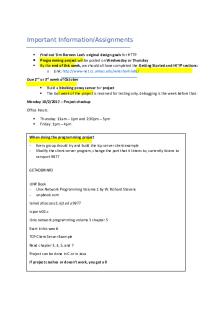
2 - Lecture notes 2
- 5 Pages

Lecture notes, lecture 2
- 3 Pages

2 Biodiversity - Lecture notes 2
- 33 Pages
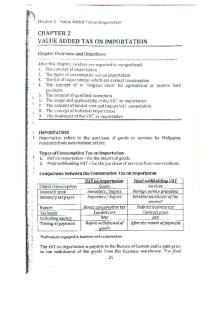
Chapter 2 - Lecture notes 2
- 30 Pages
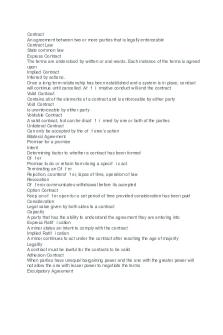
Blaw 2 - Lecture notes 2
- 4 Pages
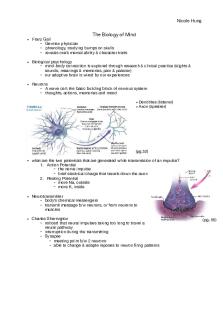
Chapter 2 - Lecture notes 2
- 4 Pages
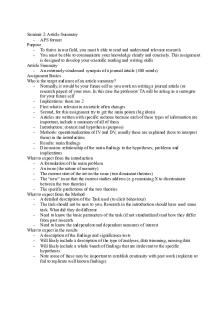
Seminar 2 - Lecture notes 2
- 2 Pages
Popular Institutions
- Tinajero National High School - Annex
- Politeknik Caltex Riau
- Yokohama City University
- SGT University
- University of Al-Qadisiyah
- Divine Word College of Vigan
- Techniek College Rotterdam
- Universidade de Santiago
- Universiti Teknologi MARA Cawangan Johor Kampus Pasir Gudang
- Poltekkes Kemenkes Yogyakarta
- Baguio City National High School
- Colegio san marcos
- preparatoria uno
- Centro de Bachillerato Tecnológico Industrial y de Servicios No. 107
- Dalian Maritime University
- Quang Trung Secondary School
- Colegio Tecnológico en Informática
- Corporación Regional de Educación Superior
- Grupo CEDVA
- Dar Al Uloom University
- Centro de Estudios Preuniversitarios de la Universidad Nacional de Ingeniería
- 上智大学
- Aakash International School, Nuna Majara
- San Felipe Neri Catholic School
- Kang Chiao International School - New Taipei City
- Misamis Occidental National High School
- Institución Educativa Escuela Normal Juan Ladrilleros
- Kolehiyo ng Pantukan
- Batanes State College
- Instituto Continental
- Sekolah Menengah Kejuruan Kesehatan Kaltara (Tarakan)
- Colegio de La Inmaculada Concepcion - Cebu





